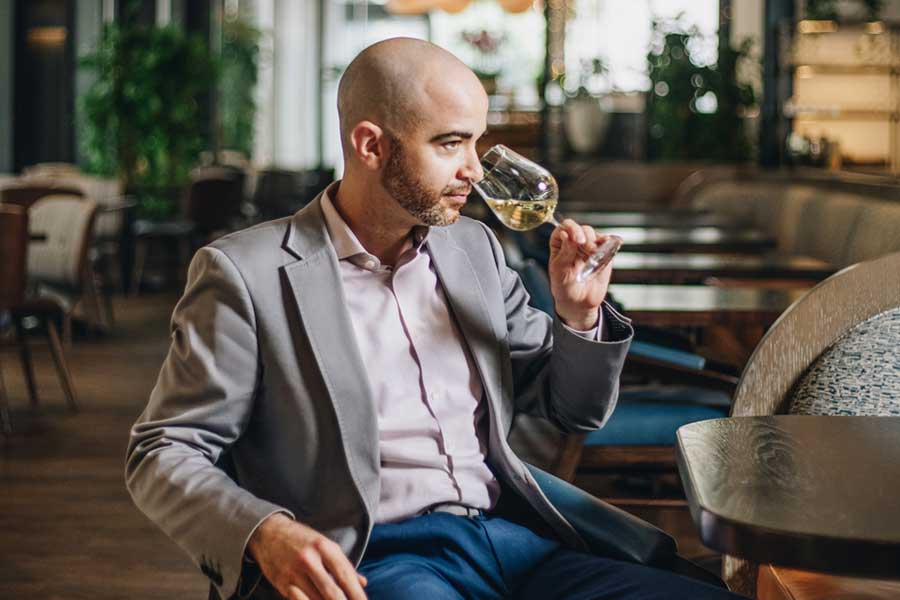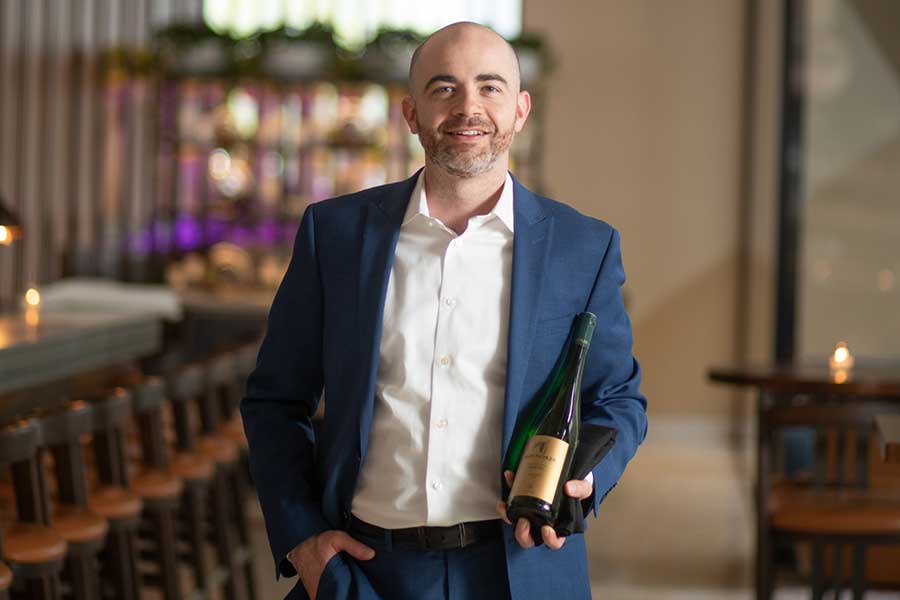The Art of the Pivot: Advice on Changing Careers From My Loup’s Former GM
After helping to open Vernick Fish and My Loup, Neil Ross is trading in his front-of-house cred for a new role and sharing the lessons he’s learned along the way.

Neil Ross tasting wine at Vernick Fish on the restaurant industry and changing careers / Photograph by Gab Bonghi
Behind the Line is Foobooz’s interview series with the people who make up Philly’s dynamic bar and restaurant scene. For the complete archives, go here.
Neil Ross has spent most of his career mastering the art of hospitality. As the former beverage manager of Estia, the former assistant general manager of Vernick Fish, and the (recently) former general manager of My Loup, he’s learned that outstanding service is about making people feel good in your presence. Coupled with a deep curiosity for wine, Ross climbed the front-of-house ranks while pursuing his wine certification, and contributed to some of the best wine lists in the city.
But after over a decade in the service industry, he’s pivoting his career in a new direction: as a rep for The Wine Merchant.
Don’t get it twisted! He loves restaurants and thoroughly enjoyed every stop along his impressive career. He was just offered an opportunity he couldn’t refuse, and we are here for it. Everyone deserves to pursue their passions, which got us thinking — after building a resume on one career path, how do you transition to another?
As Ross looks back, he’s realizing that all of the soft skills he’s picked up over the years — the things you might assume were specific to working in restaurants — are actually key to pivoting.
Below, we talk to Ross about the his career in hospitality, his philosophy on creating positive interactions with both co-workers and customers, and knowing when it’s his time to move on.
My first restaurant gigs were … during high school at Positano Ristorante in Ardmore on Lancaster Avenue where I worked for 11 straight years. It put me through community college and later, Temple. Then Estia where I waited tables on weekends as soon as I graduated college. From 1999 through 2019, I worked on and off at Positano and Estia.
At Temple, I studied … broadcasting, telecommunications, and mass media.
My professors at Temple taught me … more about people. Interactions, relationships, how to communicate with all different types of people, and the ability to have disagreements in an open forum without having any animosity. The moment I became a manager, it all started to unearth.
The thing I learned from reading Setting the Table: The Transforming Power of Hospitality in Business by Danny Meyer was … that my own fulfillment was coming from the act of showing people a good time. The best way to do this was to respect every minute, every second, of their presence, and be grateful that they chose to spend that time with you.
The moment when I knew I wanted to work for a chef was … During my recovery from perforated appendicitis, I started to draw this line between hospitals and hospitality; that what I’m doing is making people feel good while they’re in your presence. I knew then and there the next thing I wanted to do was work for a chef. I love Greg Vernick, and Vernick Food & Drink is my favorite restaurant. I wanted something in that category — I was looking for a really great hospitality company.

Neil Ross at Vernick Fish / Photograph by Gab Bonghi
I first developed an interest in wine when … I was at the Wine School of Philadelphia. The associate director of education at the time was Zach Morris (also of Bloomsday Cafe) was one of the first people to explain levels of objectivity in smelling and tasting wine to me, he has this organic chemistry background. I remember Zach teaching a class on Italy and tasting pinot grigio. Zach was not just saying the wine smelled like an apple; he was explaining specifically what kind of apple, and what was going on with the apple to make it smell like that, and a light bulb went off.
When I traveled to Greece with Estia … I was blown away by everything Greece had to offer, especially its hospitality. One of the winemakers’ wives had us in their home and cooked us dinner. It was truly eye-opening to see how hard winemaking and growing proper fruit was, and how to decide to use pesticides. It gave me a greater sense of confidence in what we were doing at Estia. I could look people in the eye with great enthusiasm and know that we were delivering an authentic slice of Greece from thousands of miles away. When I came back, I looked at the owners of Estia and said, “We are going to be the centerpiece of Greek wine in Philadelphia.” And in 2016 I became the beverage director for the entire restaurant group.
I joined My Loup in … March 2023.
I felt it was my responsibility … to convince everyone in the restaurant that their work was not futile. I just tried to lead by example, to be hands-on and present. I showed the team the same level of hospitality I would show a guest, as they should too. This allowed us to fear no mistake and enjoy the recovery from a mistake, just as much as we enjoyed a “perfect” service.
I don’t think guests realize … how much we talk about them. One percent of the time it’s airing a complaint. It could also be communicating an allergy. Or it’s “This person waited seven minutes for a table, let me know what they order because I want to splash them with a free taste of one of my favorite wines.” Sometimes we have what’s called “chits” — printed short notes on a guest. The objective is to curate the experience to the individual, which requires constant dialogue (referred to as “soigné,” the French principle for being taken care of).
My work as a restaurant manager included … building a culture, steps of service, event creation and booking, and creating unique experiences consistently and frequently. But my overall objective was that every service felt like it was awesome. I want to inspire not just diners, but industry workers.
Music in a restaurant was always so important … to push individuality and uniqueness. Feeling we could go from Steely Dan to Biggie Smalls in an hour was really cool. Watching somebody bite a piece of crudo and their favorite song would come on, their eyes would be closed and they’d lean back and do a little dance — that was everything.
Some key values I am taking from My Loup to my new job are … integrity, genuine hospitality, and caring about the people who work for you. Allow people to be themselves tableside, and always maintain a constant state of flexibility. (You cannot be rigid in hospitality.) Nothing is more important than one-on-one interpersonal communication. Also, restaurants can still be a fun place to work!
One of the biggest challenges of a big restaurant is … making sure a message can get conveyed in time so another domino doesn’t fall. Like from the time a host goes from the furthest table back in the restaurant to the host stand. Also, good footwear is key!
I’m not leaving restaurants … I get to be in a different restaurant every day! I wasn’t looking for another job. I loved what we were doing at My Loup, and felt a strong sense of accomplishment of what we achieved in a short amount of time. The guy who had insight for me to join Estia, which led to so many great things, called with an opportunity to step out of my comfort zone. He thought I’d be great at selling wine. I missed working with wine directly, so if I say “no” to this now, I don’t know when I will get this chance again.


